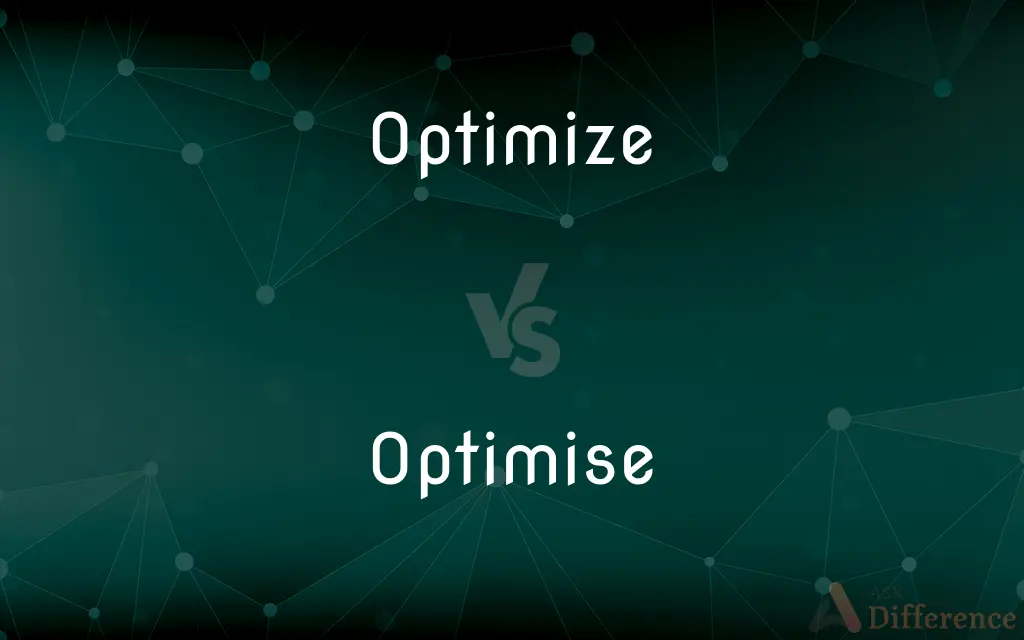Optimize vs. Optimise — What's the Difference?
By Tayyaba Rehman — Updated on October 23, 2023
"Optimize" and "optimise" have the same meaning, referring to making something as effective or efficient as possible; the difference is regional: "optimize" is American English, while "optimise" is British English.

Difference Between Optimize and Optimise
Table of Contents
ADVERTISEMENT
Key Differences
"Optimize" and "optimise" are essentially identical in meaning, embodying the essence of improving something to its best or most effective state. Both words are rooted in the concept of "optimum," denoting the most favorable condition or degree. Where they diverge is purely a matter of regional linguistic preference.
In the realm of American English, "optimize" is the standard spelling. When American companies or authors discuss enhancing a website for search engines, they are likely to refer to "search engine optimization." Similarly, in the realm of software or industrial design in the U.S., the term "optimize" would be used to denote the process of refining for peak performance.
Contrastingly, "optimise" is the spelling preferred in British English. Hence, a British company might talk about strategies to "optimise" sales. In the context of literature or research from the UK, one would encounter references to "optimise" when discussing ways to enhance or improve upon existing frameworks or methodologies.
Interestingly, this distinction between "optimize" and "optimise" mirrors several other American English vs. British English spelling differences. Words like "realize" (American) vs. "realise" (British), or "color" vs. "colour," are other examples that underscore this transatlantic linguistic divide.
Although the spellings differ, the intent and application remain consistent across both words. Whether one is looking to "optimize" a marketing campaign in New York or "optimise" a healthcare procedure in London, the objective is the same: to achieve the best possible outcome.
ADVERTISEMENT
Comparison Chart
Spelling
Ends with "-ize".
Ends with "-ise".
Regional Usage
Preferred in American English.
Preferred in British English.
Meaning
To make something as effective or efficient as possible.
To make something as effective or efficient as possible.
Examples in Literature
Commonly found in American publications.
Commonly found in British publications.
Associated Derivatives
Optimization, optimizer.
Optimisation, optimiser.
Compare with Definitions
Optimize
To improve a product or service for market competitiveness.
The team worked hard to optimize the app for user experience.
Optimise
Optimise is the spelling preferred in British English.
Optimize
To make the most effective use of a resource.
Companies optimize their resources to increase profits.
Optimise
To tweak or adjust for the best possible outcome.
Researchers are trying to optimise the medication's formula.
Optimize
To modify for a specific purpose or condition.
The athlete's diet was optimized for endurance training.
Optimise
To utilize something to its fullest potential.
Businesses should optimise their assets for maximum return.
Optimize
To refine or enhance for better performance.
Engineers work to optimize the car's fuel efficiency.
Optimise
To modify to fit a particular need or requirement.
The training regimen was optimised for strength building.
Optimize
To adjust a system or process for optimal results.
The software will optimize the computer's performance.
Optimise
To enhance or refine for peak performance.
The team aims to optimise the website's loading speed.
Optimize
To make as perfect or effective as possible.
Optimise
To elevate a product or service's quality or functionality.
Designers optimise user interfaces for ease of use.
Optimize
(Computers) To increase the computing speed and efficiency of (a program), as by rewriting instructions.
Optimize
To make the most of.
Optimize
To act optimistically or as an optimist.
Optimize
(transitive) To make (something) optimal.
Optimize
(transitive) To make (something) more efficient, such as a computer program.
Optimize
(intransitive) To become optimal.
Optimize
To make as useful, effective, or functional as possible; as, to optimize the speed of a computer program.
Optimize
To get the most out of; to use to the best effect; to exploit fully; as, to optimize one's return on investment.
Optimize
Make optimal; get the most out of; use best;
Optimize your resources
Optimize
Modify to achieve maximum efficiency in storage capacity or time or cost;
Optimize a computer program
Optimize
Act as an optimist and take a sunny view of the world
Common Curiosities
Is there a difference in the meaning of "optimize" and "optimise"?
No, the difference is purely in spelling based on regional preferences.
What about in the UK?
"Optimise" is the standard spelling in British English.
Does this spelling difference extend to other words?
Yes, many words ending in "-ize" in American English end in "-ise" in British English.
Which spelling is more common in the US?
"Optimize" is the preferred spelling in American English.
How about "optimize" in a British context?
Again, it would be understood, but "optimise" is the typical British spelling.
Is the verb form the only one affected by this spelling difference?
No, derived nouns like "optimization" (US) and "optimisation" (UK) also differ.
Can I use "optimise" in an American publication?
While it would be understood, "optimize" is the conventional spelling in the US.
Does the word have roots in Latin or Greek?
"Optimize" and "optimise" derive from the Latin "optimus," meaning "best."
Can "optimize" or "optimise" be used in both technical and non-technical contexts?
Yes, they can be applied in various contexts, from tech to health to business.
In global companies, which spelling is preferred?
It often depends on the company's origin or the primary audience they are addressing.
Are there other examples of such spelling differences?
Yes, like "realize" (American) vs. "realise" (British) or "color" vs. "colour."
Is it essential to be consistent in my use of American vs. British spellings?
Consistency is recommended, especially in formal writings or publications.
Are there synonymous terms I can use instead?
Yes, words like "enhance," "improve," or "refine" can be used depending on the context.
Are there differences in pronunciation?
Generally no, both are pronounced similarly despite the spelling difference.
Does software like Microsoft Word recognize both spellings?
Yes, but it might flag one as an error based on the language setting (US or UK English).
Share Your Discovery

Previous Comparison
Larder vs. Pantry
Next Comparison
Car vs. CarriageAuthor Spotlight
Written by
Tayyaba RehmanTayyaba Rehman is a distinguished writer, currently serving as a primary contributor to askdifference.com. As a researcher in semantics and etymology, Tayyaba's passion for the complexity of languages and their distinctions has found a perfect home on the platform. Tayyaba delves into the intricacies of language, distinguishing between commonly confused words and phrases, thereby providing clarity for readers worldwide.












































